-
ERRATUM06-14-2024
ERRATUM
Revista Brasileira de Enfermagem. 2024;77(2):e2024n2e05
Abstract
ERRATUMERRATUM
Revista Brasileira de Enfermagem. 2024;77(2):e2024n2e05
DOI 10.1590/0034-7167.20247702e05
Views0In the article “Educational technologies used to promote self-care for people with diabetes mellitus: integrative review”, with DOI number: , published in Revista Brasileira de Enfermagem, 2023;76(Suppl 4):e20230049, in the title: Where it read: […]See more -
ERRATUM06-14-2024
ERRATUM
Revista Brasileira de Enfermagem. 2024;77(2):e2024n2e06
Abstract
ERRATUMERRATUM
Revista Brasileira de Enfermagem. 2024;77(2):e2024n2e06
DOI 10.1590/0034-7167.20247702e06
Views0In the article “Is there scientific relevance to the plot of films and documentaries about eating disorders?”, with DOI number: , published in Revista Brasileira de Enfermagem, 2024;77(1):e20220547, page 7:Where it read:[…]See more -
ORIGINAL ARTICLE06-14-2024
Meanings attributed to health-related quality of life by caregivers of adolescents with diabetes
Revista Brasileira de Enfermagem. 2024;77(2):e20230314
Abstract
ORIGINAL ARTICLEMeanings attributed to health-related quality of life by caregivers of adolescents with diabetes
Revista Brasileira de Enfermagem. 2024;77(2):e20230314
DOI 10.1590/0034-7167-2023-0314
Views0See moreABSTRACT
Objective:
to interpret the meanings attributed to the health-related quality of life by caregivers of adolescents with type 1 diabetes mellitus.
Methods:
qualitative, descriptive-exploratory study of 14 caregivers of adolescents with diabetes developed at the reference outpatient clinic for endocrine diseases in a city in the state of Paraíba. Interviews were performed between May and September 2021. Inductive thematic analysis of the empirical material, and its interpretation in light of the concepts of health-related quality of life and family functioning were performed.
Results:
the meanings attributed by caregivers to the health-related quality of life of adolescents converged on the feeling of being healthy, healthy eating, satisfactory family income, family involvement in care and effective access to the care network.
Final Considerations:
knowledge of these meanings enables health professionals to develop strategies that meet the unique demands of caregivers experiencing this diagnosis.
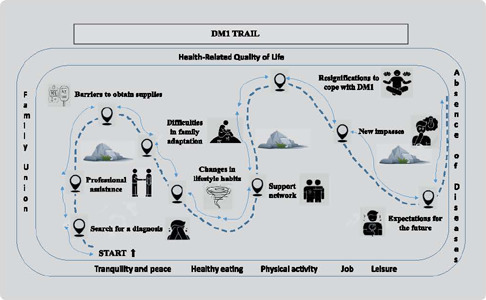
-
ORIGINAL ARTICLE06-14-2024
Teoria de médio alcance do diagnóstico de enfermagem sobrepeso
Revista Brasileira de Enfermagem. 2024;77(2):e20230372
Abstract
ORIGINAL ARTICLETeoria de médio alcance do diagnóstico de enfermagem sobrepeso
Revista Brasileira de Enfermagem. 2024;77(2):e20230372
DOI 10.1590/0034-7167-2023-0372
Views0See moreRESUMEN
Objetivo:
Construir una teoría de rango medio para el diagnóstico de enfermería Sobrepeso en adolescentes y adultos jóvenes.
Métodos:
Estudio metodológico a la luz de los marcos teóricos de Roy y de Lopes, Silva y Herdman. Un total de 3.925 artículos fueron recuperados y evaluados utilizando el software State of the Art Through Systematic Review. La muestra final fue de 28 artículos.
Resultados:
Los resultados convergieron en 3 atributos esenciales, 13 antecedentes y 7 consecuencias. Se construyó una teoría de rango medio compuesta por un diagrama ilustrado, 11 proposiciones y 12 relaciones causales.
Consideraciones finales:
A partir de la creación de la teoría, fue posible comprender mejor el diagnóstico de enfermería Sobrepeso en el contexto de adolescentes y adultos jóvenes. La comprensión de los fenómenos de enfermería contribuye para el avance y fortalecimiento de la ciencia de enfermería.
-
REVIEW06-14-2024
Critical analysis of the scientific production on Jean Watson’s Theory of Human Care
Revista Brasileira de Enfermagem. 2024;77(2):e20230231
Abstract
REVIEWCritical analysis of the scientific production on Jean Watson’s Theory of Human Care
Revista Brasileira de Enfermagem. 2024;77(2):e20230231
DOI 10.1590/0034-7167-2023-0231
Views0See moreABSTRACT
Objectives:
to analyze current scientific production on the use of the theoretical-methodological precepts of Jean Watson’s Theory of Human Care/Clinical Caritas Process.
Methods:
quantitative, exploratory, descriptive study using data from 1979 to 2023 in the Scopus database. Analysis was carried out using VOSviewer software.
Results:
the 73 studies included establish a network of collaboration among 221 authors from 155 institutions in 18 countries, who discuss the development of ethical behavior in nursing staff, through technical improvement, implementation, and validation of instrumental strategies capable of measuring and evaluating the quality of holistic and empathetic care. The Theory of Human Caring contributes to nursing training and care, and Process Clinical Caritas-Veritas is useful for the different possibilities of practice and education.
Conclusions:
it is important to strengthen with more empirical data a nursing work model centered on individual human care, supporting the evolution of scientific nursing knowledge.
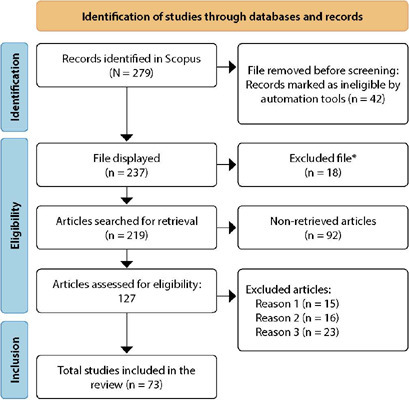
-
ORIGINAL ARTICLE06-14-2024
Sleep duration and quality of Brazilian nursing staff who work in shifts
Revista Brasileira de Enfermagem. 2024;77(2):e20230167
Abstract
ORIGINAL ARTICLESleep duration and quality of Brazilian nursing staff who work in shifts
Revista Brasileira de Enfermagem. 2024;77(2):e20230167
DOI 10.1590/0034-7167-2023-0167
Views0See moreABSTRACT
Objective:
to analyze sleep duration and sleep quality in nursing professionals who work in shifts.
Method:
this is a cross-sectional, analytical research, carried out between September 2017 and April 2018, at a public hospital in southern Brazil, with the nursing team. A socio-occupational and health symptoms questionnaire, the Epworth Sleepiness Scale, and the Pittsburgh Sleep Quality Index were used. Data are presented as descriptive and inferential statistics, bivariate analysis, and binary logistic regression.
Results:
participants were 308 nursing professionals with a predominance of long-term sleep, absence of drowsiness, and poor sleep quality. Short-term sleep (<6h) was associated with day shift and poor sleep quality. Sleep quality was associated with presence excessive daytime sleepiness and work day shift.
Conclusion:
work shift, insomnia and headache were the main factors related short-term sleep for nursing professionals. The results may justify the development of intervention research for workers’ health.
-
ORIGINAL ARTICLE06-14-2024
Duração e qualidade do sono da equipe de enfermagem brasileira que trabalha em turnos
Revista Brasileira de Enfermagem. 2024;77(2):e20230167
Abstract
ORIGINAL ARTICLEDuração e qualidade do sono da equipe de enfermagem brasileira que trabalha em turnos
Revista Brasileira de Enfermagem. 2024;77(2):e20230167
DOI 10.1590/0034-7167-2023-0167
Views0See moreRESUMEN
Objetivo:
analizar la duración y calidad del sueño en profesionales de enfermería que trabajan por turnos.
Método:
investigación analítica, transversal, realizada entre septiembre de 2017 y abril de 2018, en un hospital público del sur de Brasil, con el equipo de enfermería. Se utilizó el cuestionario sociolaboral y de síntomas de salud, la Escala de Somnolencia de Epworth y el Índice de Calidad del Sueño de Pittsburgh. Los datos se presentan como estadística descriptiva e inferencial, análisis bivariado y regresión logística binaria.
Resultados:
participaron 308 profesionales de enfermería, con predominio de sueño prolongado, ausencia de somnolencia y mala calidad del sueño. La duración corta del sueño (<6 h) se asoció con turnos de día y mala calidad del sueño. La calidad del sueño se asoció con la presencia de somnolencia diurna excesiva y con el trabajo diurno.
Conclusión:
los turnos de trabajo, el insomnio y la cefalea fueron los principales factores relacionados con la falta de sueño de los profesionales de enfermería. Los resultados pueden justificar el desarrollo de investigaciones de intervención para la salud de los trabajadores.
-
ORIGINAL ARTICLE05-27-2024
Technology for nursing care in a Maternal Intensive Care Unit: a methodological study
Revista Brasileira de Enfermagem. 2024;77(2):e20230202
Abstract
ORIGINAL ARTICLETechnology for nursing care in a Maternal Intensive Care Unit: a methodological study
Revista Brasileira de Enfermagem. 2024;77(2):e20230202
DOI 10.1590/0034-7167-2023-0202
Views0See moreABSTRACT
Objectives:
to develop and validate a nursing care plan in a Maternal Intensive Care Unit.
Methods:
a methodological study, developed in stages: integrative review; Nursing History construction; care plan restructuring; appearance and content validity by judges.
Results:
the history was organized into sections: Identification; Basic Human Needs; Physical Examination; and Assessment of Basic Human Needs. A care plan was restructured with 34 diagnoses, organized according to basic human needs. A satisfactory level of appearance validity of the history and care plan was obtained (Concordance Index varying between 86.3 and 100 for both instruments), and content validity with average indexes of 90.8 and 92.8, respectively. Thirty-four diagnoses, their interventions and nursing actions were consolidated.
Conclusions:
the instruments were considered relevant and pertinent in terms of appearance and content, and their use in the institution under study as well as in other similar services may be recommended.
-
EXPERIENCE REPORT08-19-2019
Hypothermia post-cardiopulmonary resuscitation with low inputs: an experience report
Revista Brasileira de Enfermagem. 2019;72(4):1114-1118
Abstract
EXPERIENCE REPORTHypothermia post-cardiopulmonary resuscitation with low inputs: an experience report
Revista Brasileira de Enfermagem. 2019;72(4):1114-1118
DOI 10.1590/0034-7167-2017-0771
Views1ABSTRACT
Objective:
to report the experience of conducting directed temperature control of a post-cardiopulmonary resuscitation patient, with reduced and basic inputs available at the institution.
Method:
an experience report of directed temperature control in patient (age 15 years), after four hours of cardiopulmonary resuscitation in an Intensive Care Unit of a hospital in São Paulo State countryside in 2016, according to the protocol suggested by the American Heart Association, in 2015. There were applications of cold compresses, plastic bags with crushed ice and rectal temperature control.
Results:
after eight hours, temperature had reached 93.2 ºF. Body cooling was maintained for 24 hours. However, bags with crushed ice were used in the first 6 hours.
Conclusion:
conduct of nurses to obtain the body cooling with reduced and basic inputs was effective during the stay at the Intensive Care Unit.
Keywords:Body Temperature RegulationCardiopulmonary ResuscitationHeart ArrestHypothermia InducedIntensive Care UnitsSee more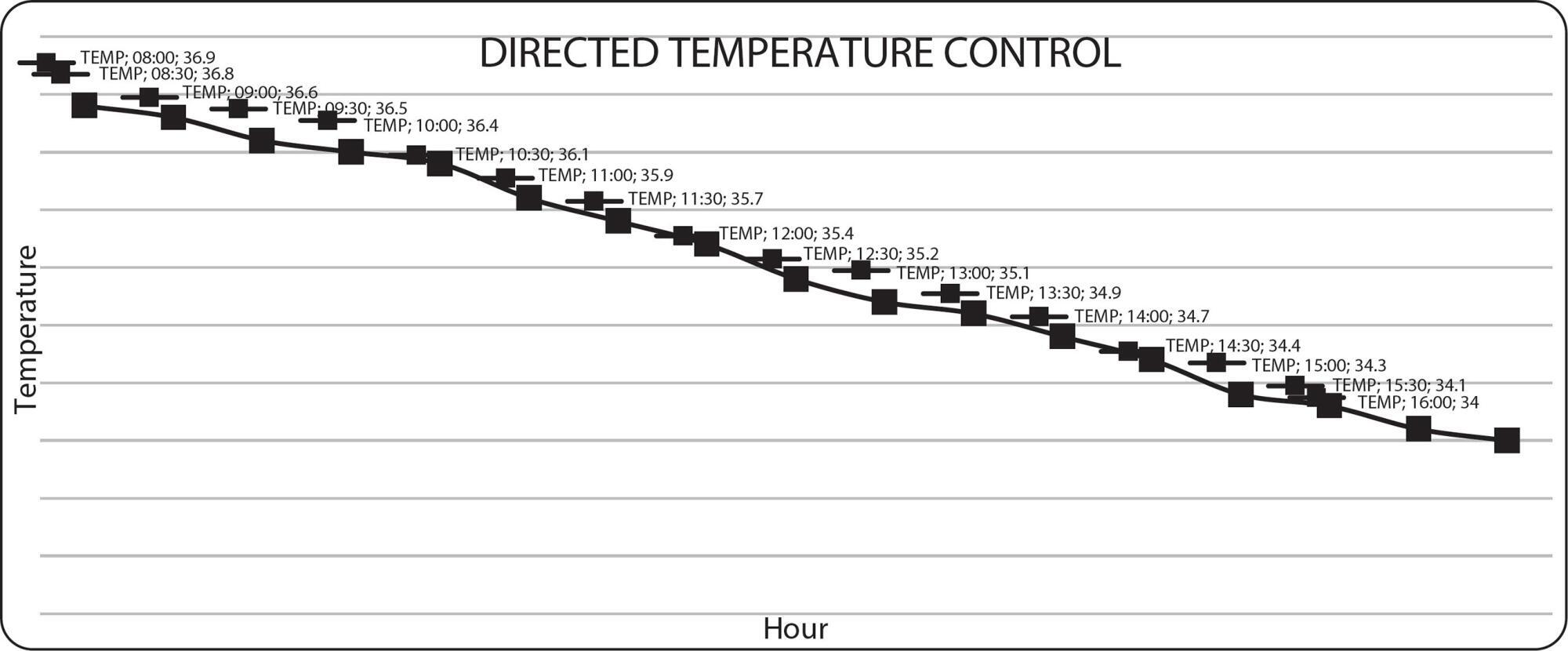
-
Individual and contextual variables associated with smoking and alcohol consumption during pregnancy
Revista Brasileira de Enfermagem. 2021;74:e20200804
Abstract
Individual and contextual variables associated with smoking and alcohol consumption during pregnancy
Revista Brasileira de Enfermagem. 2021;74:e20200804
DOI 10.1590/0034-7167-2020-0804
Views1See moreABSTRACT
Objective:
to analyze the association between individual characteristics and housing context with smoking and alcohol consumption during pregnancy.
Methods:
a cross-sectional study with a probabilistic sample of 3,580 pregnant women who underwent prenatal care in the Unified Health System in 2019. The outcomes were firsthand, secondhand smoke and alcohol consumption during pregnancy. Individual characteristics and the living environment were used as exploratory variables.
Results:
living in a neighborhood with episodes of violence, without social cohesion and without urban elements that encourage physical activity was associated with smoking. Alcohol consumption during pregnancy was associated with living in environments that do not encourage physical activity. Smoking was also associated with lower income and education.
Conclusions:
individual characteristics and the living environment are associated with smoking, secondhand smoke and alcohol consumption during pregnancy.
-
Overview of clinical trial protocols for behavioral insomnia in infants
Revista Brasileira de Enfermagem. 2021;74:e20200769
Abstract
Overview of clinical trial protocols for behavioral insomnia in infants
Revista Brasileira de Enfermagem. 2021;74:e20200769
DOI 10.1590/0034-7167-2020-0769
Views1See moreABSTRACT
Objective:
to describe the overview of clinical trial protocols for behavioral insomnia in infants.
Methods:
an analytical study that reviewed protocols registered with the International Clinical Trials Registry Platform between August and September 2019, aiming to identify the interventions for behavioral insomnia in infants, the comparators, the main primary, secondary outcomes and their respective measurements.
Results:
eleven protocols registered between 2004 and 2018 were included. Nurses were the main coordinators of protocols (45.5%), with proposals using educational technologies, one-to-one and online follow-up consultations. The main outcome was improvement of infant and maternal sleep patterns. Secondary outcomes were anxiety, depression, and parental sexual satisfaction. To measure them, the following were used: sleep diary (54.5%), actigraphy (45.4%), and the Pittsburgh Sleep Quality Interview (36.3%) and Extended Brief Infant Sleep Questionnaire (27.2%) were used.
Conclusion:
the protocols proposed interventions for independent sleep, aiming at quality of sleep for the whole family.
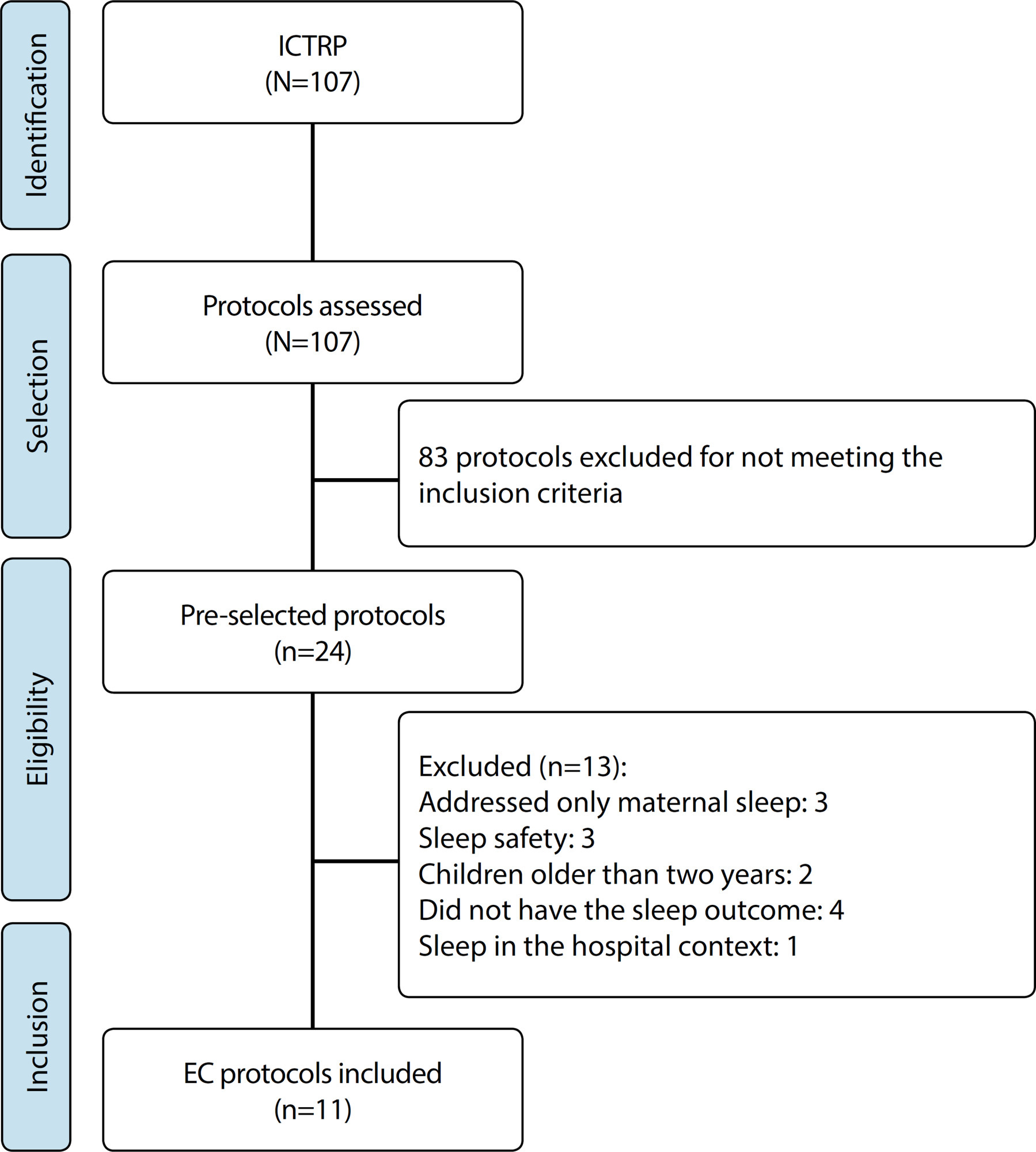
-
ORIGINAL ARTICLE07-30-2021
Curricular reforms in the transformation of nursing teaching in a federal university
Revista Brasileira de Enfermagem. 2021;74(4):e20201242
Abstract
ORIGINAL ARTICLECurricular reforms in the transformation of nursing teaching in a federal university
Revista Brasileira de Enfermagem. 2021;74(4):e20201242
DOI 10.1590/0034-7167-2020-1242
Views1See moreABSTRACT
Objectives:
to discuss the curricular reforms adopted for nursing teaching in Brazil, from 1969 to 2019.
Methods:
historical, qualitative approach using the thematic oral history and document research. 13 interviews were carried out with graduation nursing professors from a federal university in the South of Brazil. The document sources were the political-pedagogical projects of the course and their associated documents. Minayo’s thematic analysis was used.
Results:
nursing curricula delineates the profile of the professional that must be formed and are reviewed in order to be adapted to social and educational changes, showing the scientific and professional potential of the nurse. Curricular reforms consider the quality of nursing formation.
Final Considerations:
the structure of the curriculum and the reforms that took place emerged according to the historical, political, epidemiological and social context demanded from the profession, to attend to the demands of society and to the work market.
-
REVIEW07-09-2021
Breast cancer screening in Primary Health Care in Brazil: a systematic review
Revista Brasileira de Enfermagem. 2021;74(3):e20200995
Abstract
REVIEWBreast cancer screening in Primary Health Care in Brazil: a systematic review
Revista Brasileira de Enfermagem. 2021;74(3):e20200995
DOI 10.1590/0034-7167-2020-0995
Views1See moreABSTRACT
Objectives:
to analyze care strategies for breast cancer screening in Primary Health Care in Brazil.
Methods:
this is a systematic review following the Cochrane Collaboration recommendations.
Results:
among 355 manuscripts, five were eligible. The patient navigation program by Community Health Agent stood out with the best result, among the strategies: flexibility of goals considering viability; community engagement; team training; active search of the target population by Community Health Agent; request for mammography by physicians; actions integrated to women’s health; monitoring of mammography results, absent users, and population coverage by physician and nurse; and assessment of criteria for requesting screening mammography by means of an information system. The population coverage rate in the program ranged from 23% to 88%.
Conclusions:
Primary Health Care in Brazil presents devices with potential to induce the production of care for breast cancer screening.

-
ORIGINAL ARTICLE05-28-2021
Cultural adaptation and validation of an instrument about nursing critical thinking skills
Revista Brasileira de Enfermagem. 2021;74(2):e20200720
Abstract
ORIGINAL ARTICLECultural adaptation and validation of an instrument about nursing critical thinking skills
Revista Brasileira de Enfermagem. 2021;74(2):e20200720
DOI 10.1590/0034-7167-2020-0720
Views1See moreABSTRACT
Objectives:
to validate the Nursing Critical Thinking in Clinical Practice Questionnaire regarding cultural aspects and metric properties.
Methods:
a methodological research carried out through cross-cultural adaptation, face and content validity, dimensional construct and known groups validity, test-retest reliability and internal consistency. 511 nurses from four hospitals participated in the study, of which 54 participated in retest.
Results:
the instrument validation for Brazilian Portuguese maintained equivalences, according to the original version. The dimensional validity demonstrated adjustment to the tetrafactorial structure of the original version (GFI=0.69). There were statistically significant differences in critical thinking skills between nurses with graduate degrees and who undertook training, reading articles, developing research and working in an institution with a longer time implementation of the Nursing Process. The instrument showed temporal stability (ICC 073-0.84; p<0.001) and adequate internal consistency (α=0.97).
Conclusions:
the instrument proved to be valid and reliable for the studied population.
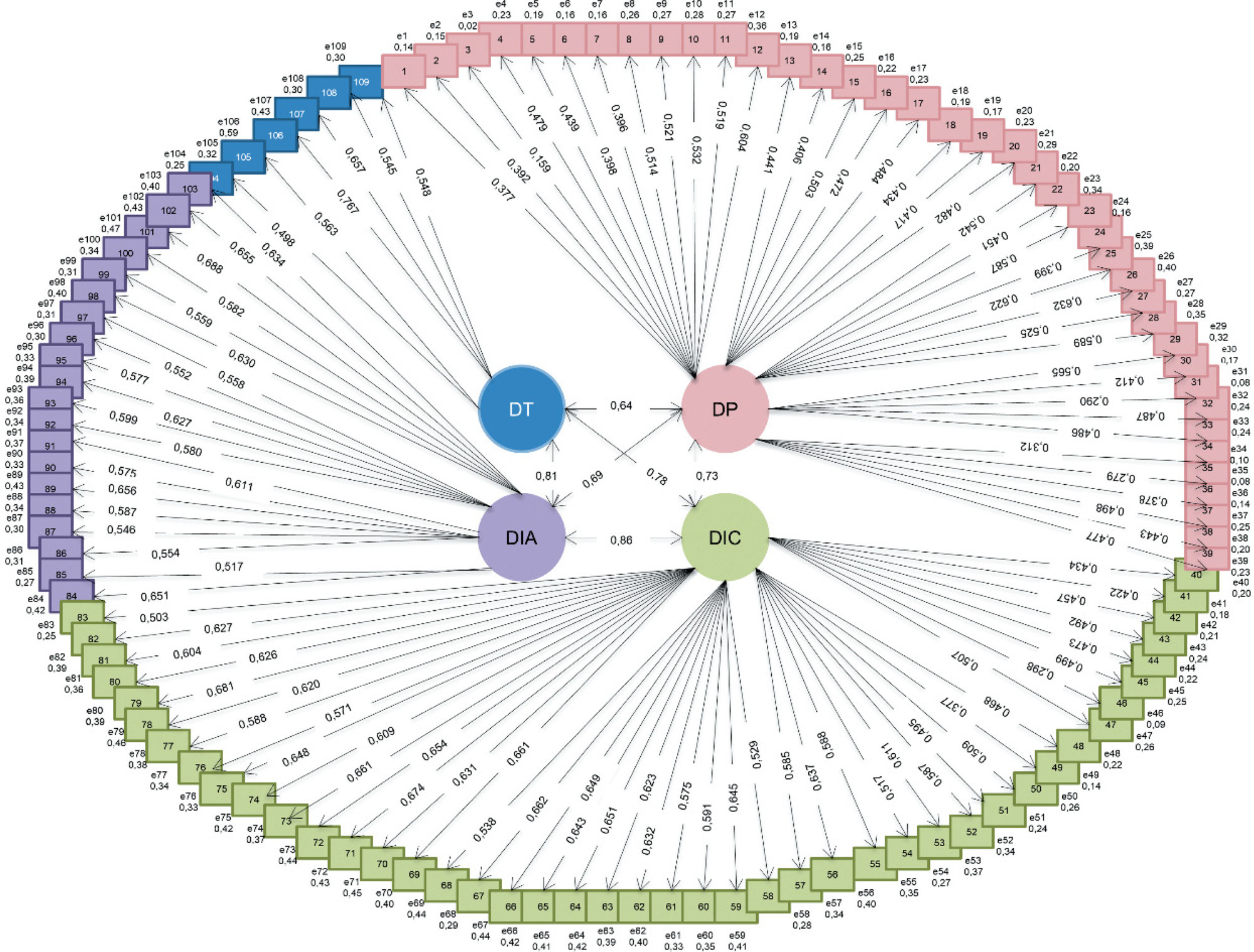
-
ORIGINAL ARTICLE05-28-2021
Prevalence and severity levels of post-radical prostatectomy incontinence: different assessment instruments
Revista Brasileira de Enfermagem. 2021;74(2):e20200692
Abstract
ORIGINAL ARTICLEPrevalence and severity levels of post-radical prostatectomy incontinence: different assessment instruments
Revista Brasileira de Enfermagem. 2021;74(2):e20200692
DOI 10.1590/0034-7167-2020-0692
Views1See moreABSTRACT
Objectives:
to analyze urinary incontinence prevalence and severity in prostatectomized men assessed by three different instruments.
Methods:
a cross-sectional study was conducted with 152 men. The pad test, pad used, and International Consultation on Incontinence Questionnaire – Short Form (self-report) were considered. Data were analyzed using Spearman’s correlation, Kappa index, considering a significance level of 0.05.
Results:
urinary incontinence prevalence was 41.4%, 46.7% and 80.3% according to pad used, pad test and self-report. Positive correlations and moderate to poor agreement were found between the instruments. As for severity, most participants had mild incontinence. The largest number of cases of mild and severe incontinence was identified by self-report.
Conclusions:
the self-report showed higher values for prevalence of mild and severe severity levels. Through the identified differences, we propose that the objective assessment (pad used and pad test) be associated with individuals’ perception (self-report) to better estimate prevalence and severity.

-
ORIGINAL ARTICLE05-28-2021
Managed clinical protocol: impact of implementation on sepsis treatment quality indicators
Revista Brasileira de Enfermagem. 2021;74(2):e20200282
Abstract
ORIGINAL ARTICLEManaged clinical protocol: impact of implementation on sepsis treatment quality indicators
Revista Brasileira de Enfermagem. 2021;74(2):e20200282
DOI 10.1590/0034-7167-2020-0282
Views1See moreABSTRACT
Objectives:
to assess the impact of the implementation of a managed sepsis protocol on quality indicators of treatment for septic patients in an emergency department of a university hospital.
Methods:
an observational epidemiological study involving septic patients. The study was divided into two phases, pre-intervention and intervention, resulting from the implementation of the managed sepsis protocol. The study variables included sepsis treatment quality indicators. The results were statistically analyzed using the program Epi InfoTM.
Results:
the study sample included 631 patients, 95 from pre-intervention phase and 536 from intervention phases. Implementing the protocol increased patients’ chances of receiving the recommended treatment by 14 times. Implementing the protocol reduced the hospitalization period by 6 days (p <0.001) and decreased mortality (p <0.001).
Conclusions:
this study showed that implementing the managed protocol had an impact on the improvement of sepsis treatment quality indicators.

Search
Search in:
Nuvem de Tags
Aged (144) Atenção Primária à Saúde (239) COVID-19 (104) Cuidados de Enfermagem (269) Educação em Enfermagem (151) Educação em Saúde (139) Enfermagem (930) Estudos de Validação (131) Health Education (144) Idoso (208) Mental Health (149) Nursing (987) Nursing Care (306) Patient Safety (151) Primary Health Care (284) Qualidade de Vida (104) Quality of Life (106) Saúde Mental (145) Segurança do Paciente (150) Validation Studies (108)



